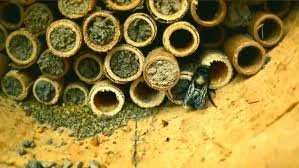Whenever we offer manmade structures to wildlife for feeding and nesting we are risking concentrating animals and with them, the potential spread of disease or threat from opportunist predators. Here are some examples.
Mason Bee Boxes. We have learned that bee boxes designed to support nesting mason bees can actually endanger them. If the tubes aren’t long enough the mason bee’s predators can prey on the eggs and/or larvae before they can mature. And because mason bees tend to return to their nesting sites year after year, reused nesting boxes can concentrate parasites and diseases and predatory species can become too familiar with the box locations and increase their rate of predation at the risk of the mason bees.
Bird Feeders. They certainly add to the enjoyment of watching and learning about birds and those unbelievably acrobatic squirrels, but they do offer up a unique opportunity for raptors. Make sure to offer nearby cover and possibly wire-enclosed feeders for smaller birds.
Unmaintained Bird Feeders. Bird feeders, hummingbird feeders and bird baths, if not cleaned regularly, can endanger your valued wildlife. Be sure to follow this advice on from the National Audubon Society website.
Special Threats to Hummingbirds. Public Service Announcement on Behalf of Hummingbirds: If you have feeders, PLEASE USE ONLY PLAIN WHITE SUGAR in your mixture of 1 part sugar to 4 parts water. Change the sugar water mixture and clean the feeder every couple of days, especially during high temperatures, as the nectar will start to ferment if it sits out for days on end. Black mold in feeders can be deadly to hummers. If you can't or won't do this consistently, please do not put out a feeder at all.
Beware small bees and ants who can invade the feeder through those small holes and can scare off hummers who have to stick their tongues into those spaces. Some feeders have small silicone guards that keep the insects out and ant moats can be filled with water and hung above the feeder.
GROW YOUR OWN BIRDFEEDERS.
For ALL birds, plant native plants that host insect larvae, provide berries, seeds, nectar, building materials, and shelter. Plant layers to support the widest variety of wildlife.
For hummingbirds, a great alternative to hummingbird feeders are flowering plants with tubular flowers such as natives Coral honeysuckle, Trumpet vine, Bee balm, and Eastern columbine.


